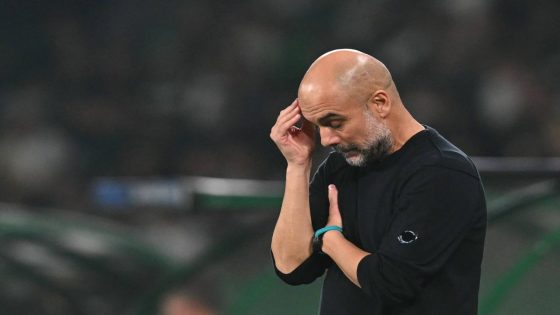After Manchester City’s 4-1 defeat to Sporting Lisbon on Tuesday evening Bernardo Silva said that his side were “in a dark place,” although Pep Guardiola did not agree.
The City boss pointed out that his side had played very well for the most part, like they did when exiting the Carabao Cup at Tottenham last week. Guardiola is not blind to City’s issues, though, admitting that they were not good enough in defeat at Bournemouth at the weekend and that they struggled to contain Sporting’s counter-attacks.
Guardiola has been largely satisfied with his side’s efforts in recent weeks; where some saw narrow victories against Fulham, Wolves and Southampton as fortunate, the City manager has been pleased with their fight and desire to get the job done.
But there’s no getting away from the fact that over the past week City have lost three times. Add to that the manner of Tuesday’s defeat, plus Bernardo’s comment and there’s definitely a hint of crisis about the club right now. So here’s an inquest into just what has been going wrong.
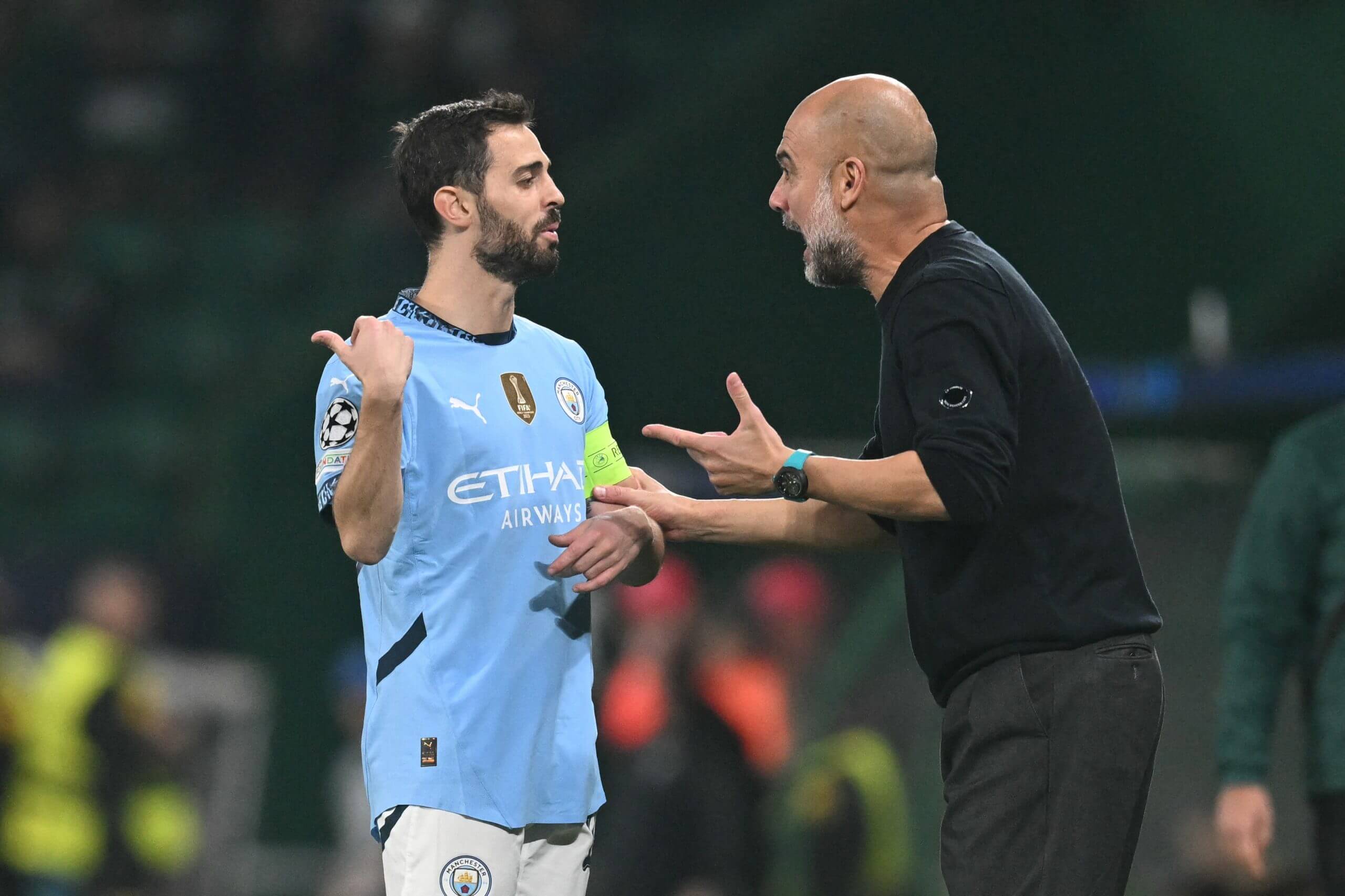
The injuries
The obvious place to start is the injuries. Ballon D’Or winner Rodri is the biggest and most obvious loss, compounded by fellow midfielder Kevin De Bruyne missing almost two months. Various other players have dropped out in recent weeks, including Ruben Dias, Jack Grealish and Jeremy Doku. The biggest problems flow from there, although in the wake of the Sporting defeat there have been complaints among supporters about the club’s recruitment — or lack of — over the past two years.
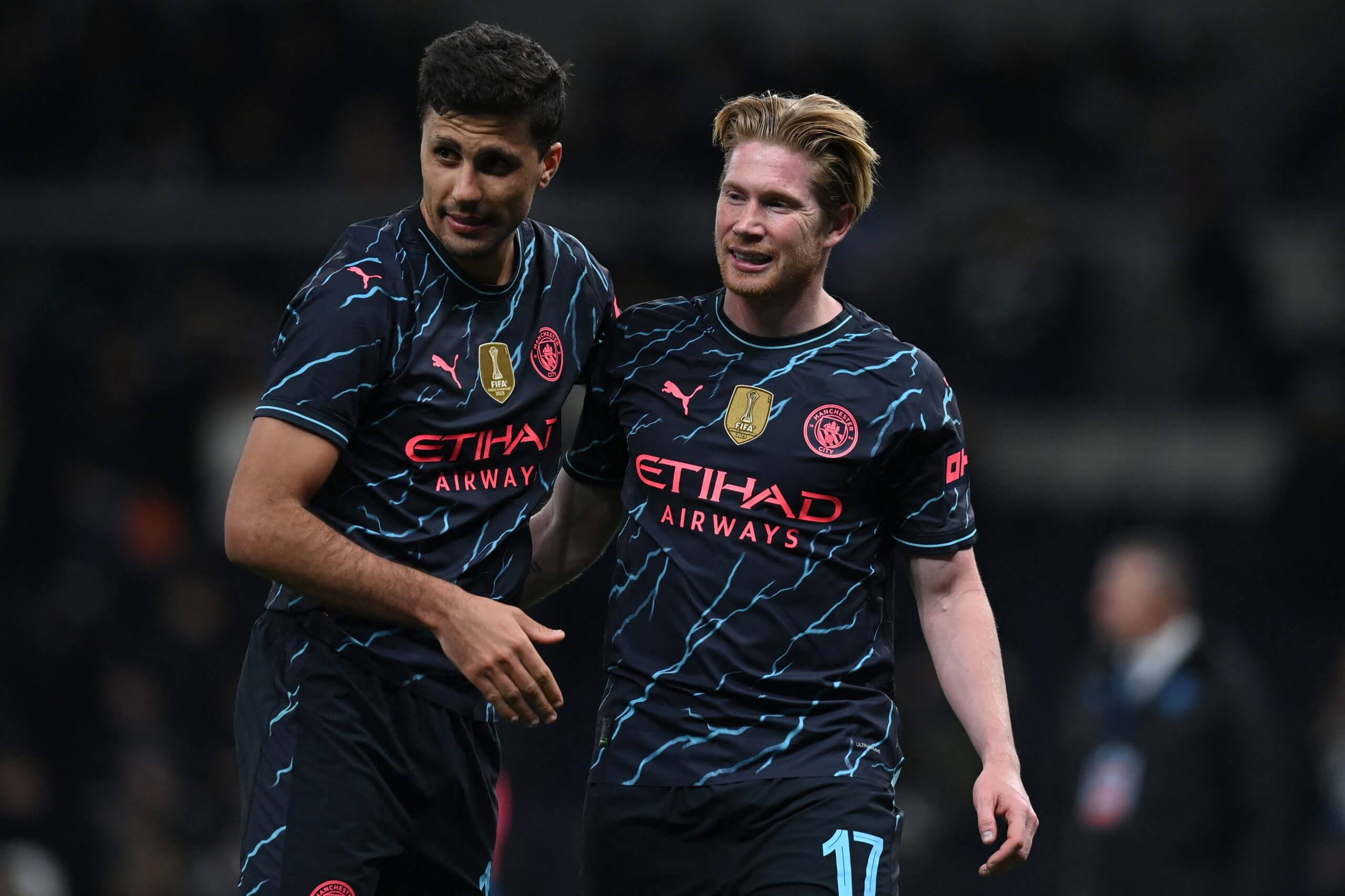
Whatever the rights and wrongs of City’s approach to the transfer market, they have been hit with a significant number of injuries at the same time and that has had an obvious knock-on effect. Combined with the fact that others, like Ilkay Gundogan and Phil Foden (who is, in fairness, improving week by week) have not been playing at their peak level, it is perhaps no surprise that some of the team’s recent performances, even when victorious, have looked a little underwhelming.
A soft centre
Guardiola’s answer when he spots a weakness in his team, not least when Rodri is not available, is to fill the midfield with ball players and instruct them to make as many passes as possible, to wrestle control of the game and build from there. That was, in fact, exactly what they did in Lisbon on Tuesday night, and with players like Rico Lewis, Mateo Kovacic, Bernardo Silva and Gundogan, they have players who are very good at keeping the ball.
The problem is that those players are not especially athletic when it comes to winning the ball back or even chasing it back, and that was also evident against Sporting, leaving the defence — missing Lewis because he was pushed up from right-back — exposed. That is why Tuesday’s game was a curious one. City played well but were also well beaten. In another sense, it was easy to explain: they played well with the ball, did not take their chances and were weak on the break. Fulham, Wolves and Bournemouth, as well as Spurs in the Carabao Cup, have been able to exploit opportunities on transitions in recent weeks.
Those issues are exacerbated when those charged with keeping safe control of the ball start to give it away easily, which has also been happening for a while now, with Gundogan yet to rediscover his best form since returning in the summer, Lewis is at times imprecise and Kovacic, the main fulcrum of the team in Rodri’s absence, actually embodies City’s recent form in that he does many things well within matches but can be very easily beaten, and fail to recover — as Sporting’s second goal highlighted.
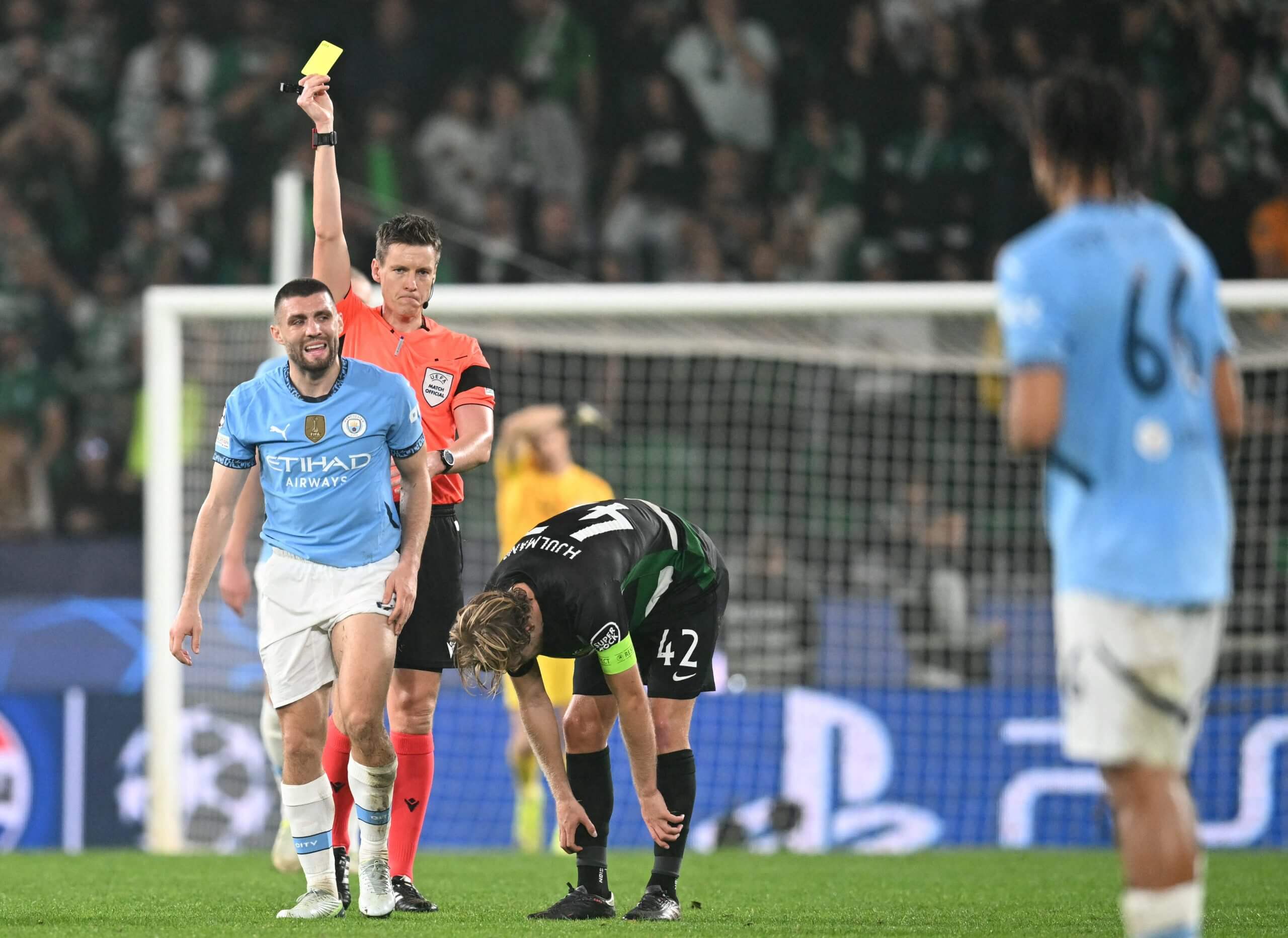
This trend has had some fans crying out for a different approach, which results in something of a vicious circle. Guardiola’s solution to these problems is more passes, more control, and he has a sound supporting argument: if City are vulnerable to fast breaks, then why not try to limit them as much as possible?

Some will argue that if the fast breaks are not being limited, why don’t the team fight fire with fire and try to be a bit more direct and play with more pace in the middle? That is a debate for another day but, in short, when most teams sit deep against City and do not allow them space to play, there is not really anywhere to break into. The shorter and blunter answer is that we already know that Guardiola just will not consider it.
Lack of goals
This is quite the statement about the Premier League’s second-highest scorers (behind Spurs) but they do seem to be lacking goals, which is something that Guardiola acknowledged on Tuesday. “We have to do a lot to score,” he said.
The thing about the start of the season, when, in fairness, City looked very good without Rodri, was that Haaland was breaking records left, right and centre, so very few people noticed that hardly anybody else was scoring, or needed to score.
John Stones has recorded a couple of important last-gasp strikes in recent weeks, Josko Gvardiol is doing his bit from the back, too, and Kovacic has contributed, but too often in matches there is a lack of bite in the final third, meaning that when City are able to pen teams back in their box like they have done for years, they do not always look like scoring — which was more or less the case on Tuesday night. And when there’s the frailty in midfield mentioned in the previous section, it adds up to the kind of problems we are seeing.
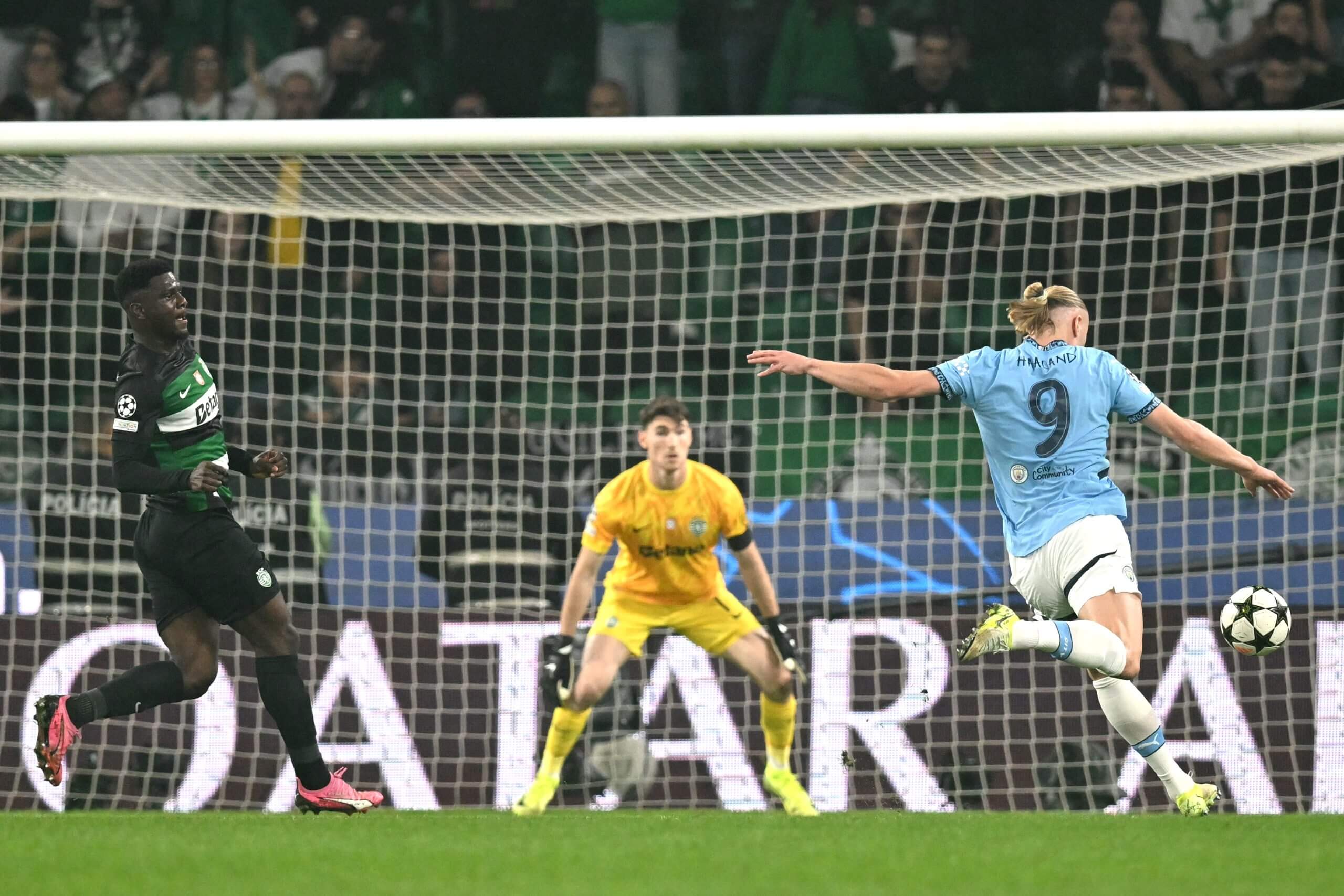
On the wings City have players who are superb in bringing the ball up to and into the box — but who lack an end product inside it. In fairness to Savinho he could have had three excellent assists against Southampton only for others to squander the chances, and the Brazilian has started his City career well, but at the moment he is not a goal threat, and neither is Doku.
Grealish is out of the picture again but by his own admission has never been a goalscorer, while Matheus Nunes is playing well of late on the left wing but rarely brings goals either.
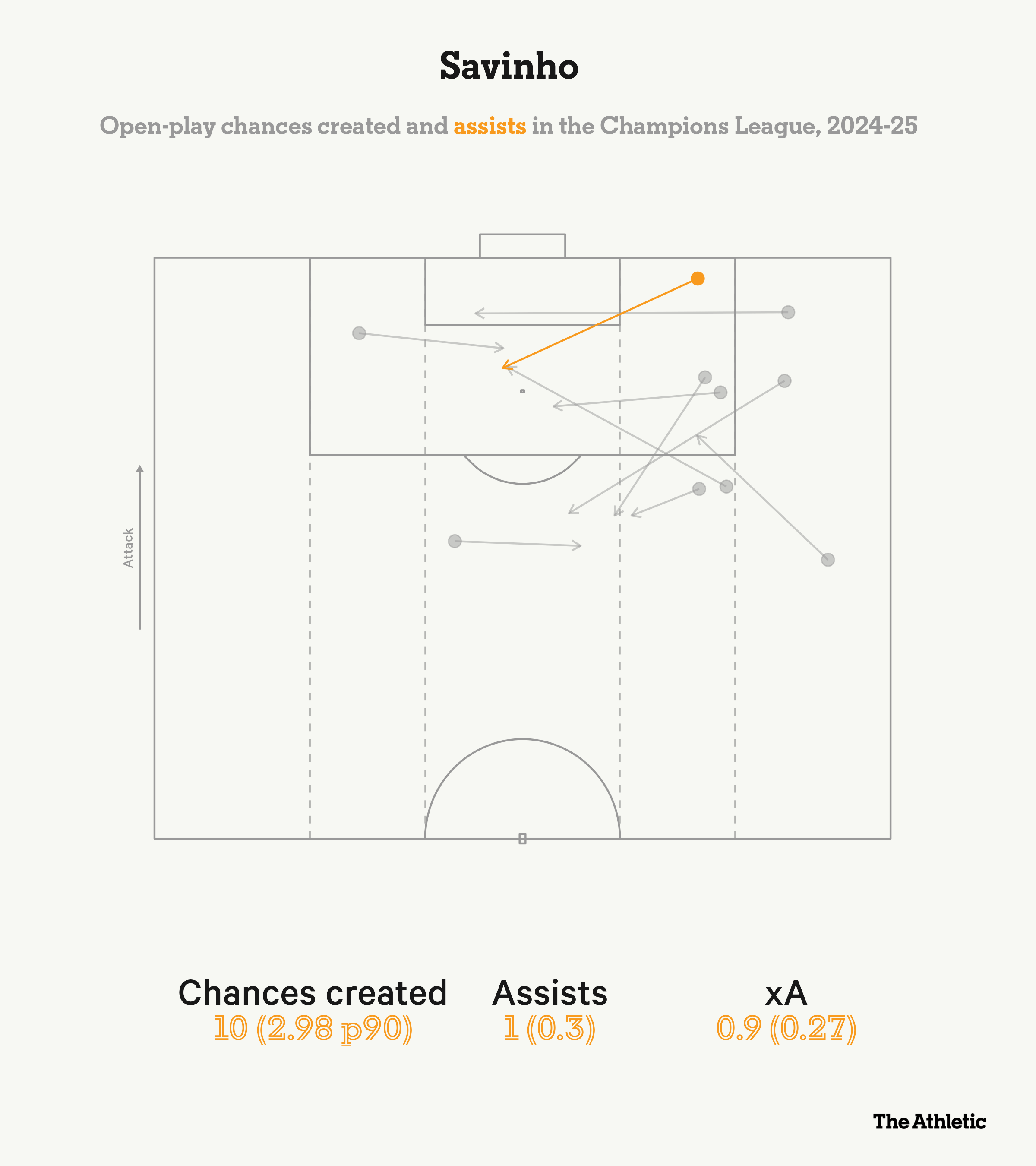
Foden was decent on Tuesday but has taken a while to get back to the levels he showed last season, and Gundogan, a regular source of goals before his move to Barcelona, has been nowhere near that level since returning.
City have scored four times from corners in the Premier League this season which more than any other team, although they have also taken the most — 98. Their conversion rate from corners is the sixth-best in the league, which is obviously good, but four goals from 98 corners ties into the idea that they have to do a lot to score, especially when rivals such as Arsenal spend so much time and effort on set-plays.
All in all it does feel like City are in a gloomy place at the moment, but that comment from Bernardo is reminiscent of a similarly worrying message from Gundogan 18 months ago. “I feel like something is missing, something’s off,” he said in January 2023. “At the minute there’s a special recipe missing — performances, the desire and hunger is not as in recent years.” And that season ended pretty well.
It would be a stretch to suggest another treble is around the corner but that Gundogan quote should help to put things into perspective. The best way for City to do that is to put things right against Brighton on Saturday evening.
With Tottenham and Liverpool coming up after the November international break, they are going to need to tighten up in defence and midfield and start taking some more chances when they arrive. It’s rare for a mini-crisis to develop into a major problem at City but this is a side who are more vulnerable than we’ve seen them for some time.
(Photo by Patricia De Melo Moreira/AFP via Getty Images)
